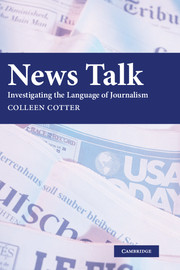Book contents
- Frontmatter
- Contents
- List of figures and tables
- Acknowledgements
- Introduction
- Part I The process and practice of everyday journalism
- 1 An interactional and ethnographic approach to news media language
- 2 Craft and community: Reading the ways of journalists
- 3 The ways reporters learn to report and editors learn to edit
- Part II Conceptualizing the news
- Part III Constructing the story: texts and contexts
- Part IV Decoding the discourse
- Conclusion and key points
- Epilogue
- Appendices
- Glossary of news and linguistic terms
- References
- Index
3 - The ways reporters learn to report and editors learn to edit
Published online by Cambridge University Press: 05 June 2012
- Frontmatter
- Contents
- List of figures and tables
- Acknowledgements
- Introduction
- Part I The process and practice of everyday journalism
- 1 An interactional and ethnographic approach to news media language
- 2 Craft and community: Reading the ways of journalists
- 3 The ways reporters learn to report and editors learn to edit
- Part II Conceptualizing the news
- Part III Constructing the story: texts and contexts
- Part IV Decoding the discourse
- Conclusion and key points
- Epilogue
- Appendices
- Glossary of news and linguistic terms
- References
- Index
Summary
KEY POINTS
Nowadays, reporters learn their craft in college or university in undergraduate or master's-level journalism programs, from textbooks, through newsroom internships, and on-the-job, the last functioning as a daily renewal of skills, values, and priorities throughout the duration of a career.
Socialization into the profession is a complex process, involving internalizing a set of assumptions of practice and professional identity.
The journalistic community makes distinctions between “reporting” and “writing,” emphasizing process-oriented “reporting” as a value; and between different types of editing (either for content and story organization or for usage and style). It prioritizes “local” news over international or other types of cognitively distant news.
Old reporters never retire: they live on in emails that contain spellings like “adviser,” series with the last comma deleted[,] and a sensitivity to relative pronouns; or they retain their radio-trained mode of listening in conversation without making response noise. People in the news business learn to report, edit, produce, and think about the news in ways that become habitual and a reflexive part of their everyday actions. While there is ample variation among news outlets, there is enough unanimity such that journalists in Florida could easily practice their craft in Alaska or the UK. The professional socialization of most journalists today begins in the classroom, where courses focus almost exclusively on learning practical skills. After that, the newsroom provides a constant reinforcement of competent practice, for both novices and veterans.
- Type
- Chapter
- Information
- News TalkInvestigating the Language of Journalism, pp. 49 - 64Publisher: Cambridge University PressPrint publication year: 2010



